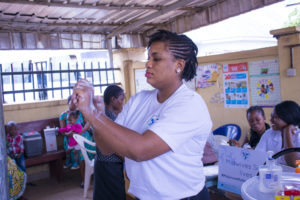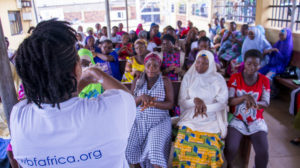Clean hands protect mothers and newborns in Nigeria through COVID-19
Published: May 8, 2020
Rita Momoh is a registered nurse and midwife with Wellbeing Foundation in Abuja, Nigeria. She graduated with her nursing degree from Adamawa State College in northeast Nigeria and began her nursing practice at an orthopedic hospital in Jos, Nigeria. Rita practiced as a nurse before returning for an 18-month long midwifery post-basic education course at Our Lady of Apostle School of Midwifery. She has practiced as a midwife for the past 8 years.
A call for safe maternity care amid crisis
In the midst of a health crisis, the role of safe and clean care becomes even more clear. Despite the chaos surrounding COVID-19, one thing remains constant: women have babies. In Nigeria, there are still low levels of facility-based delivery and skilled birth attendance, contributing to a high newborn mortality rate in the country. This is heightened by a lack of water, sanitation, and hygiene (WASH) in health facilities. Across Nigeria, only 31% of healthcare facilities have access to a basic hand hygiene facility. This creates obstacles to safe and quality care, especially for expecting mothers.
The need for a hygienic birth environment is critical to deliver safe care. However, Rita explained that the typical situation is far different, “Both midwives and mothers need WASH in each healthcare facility. In most facilities, there are no running taps and this leads to an environment which is more conducive to spreading infections rather than reducing them.”
Ensuring safe practices through education
Despite these obstacles, Rita is determined to help expecting mothers have quality care, including a healthy environment for care. Through her role, Rita is responsible for delivering knowledge and best practice techniques at public and private healthcare facilities across Nigeria. The Wellbeing Foundation’s MamaCare360 program provides mothers with comprehensive antenatal and postnatal education. Classes focus on elements of birth preparedness, newborn care, nutrition, and WASH with the aim of preventing maternal and newborn sepsis and ensuring safer births overall. To address the issue of access, MamaKits, which include soap and alcohol-based hand rub, are delivered to healthcare facilities to provide sufficient resources for midwives and pregnant mothers.
Rita understands her critical responsibility to her patients to promote good hand hygiene: “I decided to focus on hand hygiene because when it is done well, it can reduce healthcare-associated infections. When there is a spread of disease as there is now, the outbreak can be stopped at the source with preventative lessons on handwashing and access to handwashing stations.”
Prior to the MamaCare program, healthcare staff did not have frequent training for hand hygiene. It is important to ensure healthcare staff know the proper techniques for hand hygiene, even with challenges in access to water and handwashing stations. Rita and other Wellbeing midwives maintain relationships with the healthcare facilities, ensuring trainings for hand hygiene and other key practices are conducted on a regular basis.
Advocating for clean hands long-term
When asked how others can improve hand hygiene, Rita commented, “Firstly, you must be trained before you can start to train other people on the benefits and best practices for hand hygiene. Until access is fully addressed, we will continue to see bad outcomes, but we can do our part to spread awareness and education on what we know is true.”
The success of the MamaCare program is only the beginning in Rita’s mind. There is still an urgent need to provide running water to healthcare facilities in both rural and urban areas. More prioritization on the importance of handwashing and hand hygiene across Nigeria is needed. Rita will continue to push for access to more resources and education, advocating for hand hygiene within and across facilities. In her view, frontline healthcare workers are key advocates to ensure WASH and hand hygiene are a priority in Nigeria: “Nurses and midwives play a key role in leading the way.”
The reality is clear in Nigeria: a lack of water, sanitation and hygiene has a huge impact on maternal and newborn health outcomes, but through Rita’s work, she is doing her part to ensure new life comes into this world through clean and safe hands.
TAGS: Case Study Hygiene in Health FacilitiesCoronavirusRx Hand Hygiene

